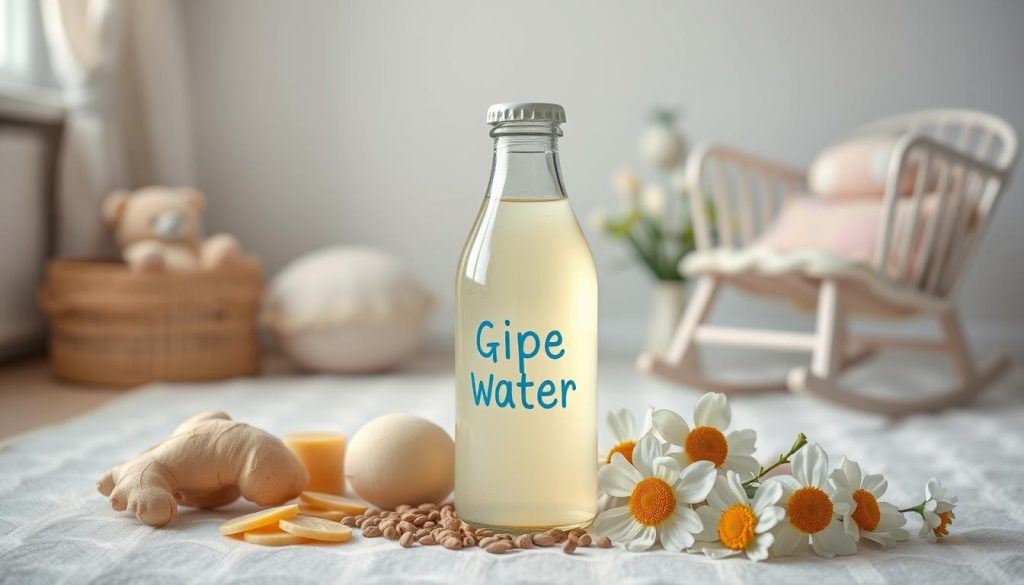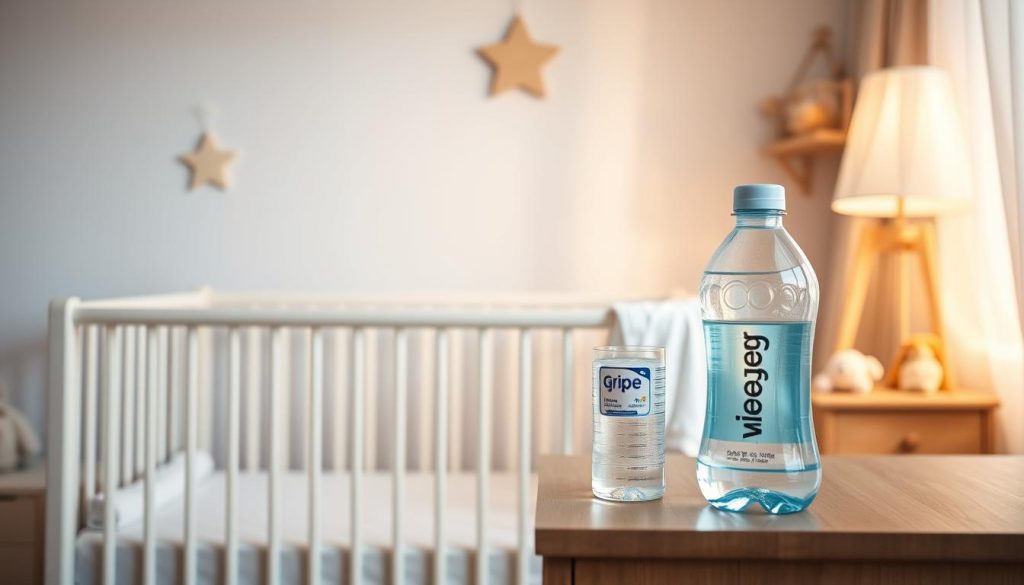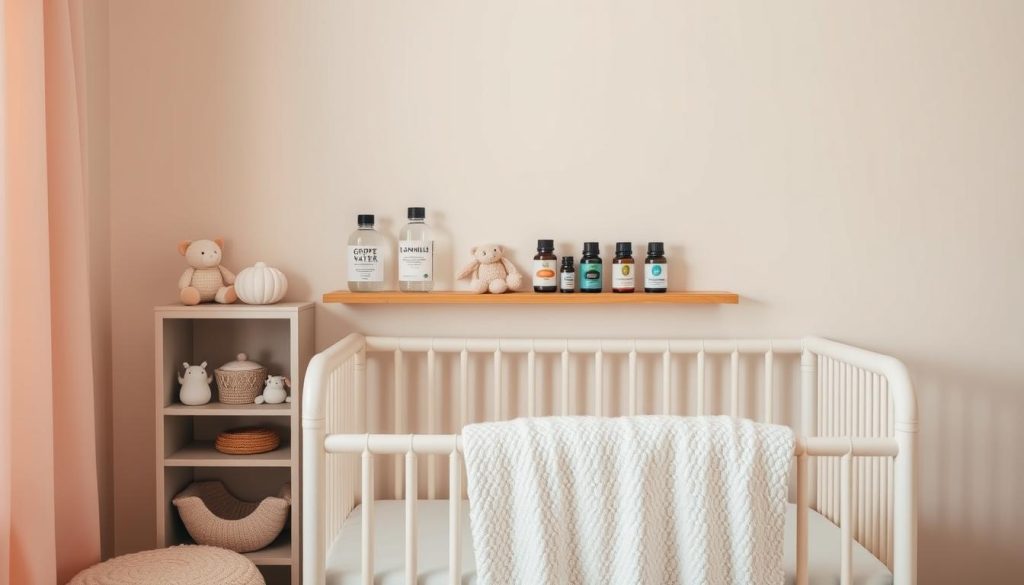When a baby cries with colic, parents often look for ways to calm them. Gripe water is one solution that has been used for a long time. It raises questions about gripe water safety and if it’s good for babies.
Parents want to find infant colic remedies to help their babies sleep better. They wonder if gripe water is safe for their little ones. This question is important for the health and happiness of babies.
We will look into gripe water safety in this article. We’ll examine what’s in gripe water and if it really works. We want to give parents the facts they need to make the best choices for their babies.
Understanding Gripe Water and Its Uses
Gripe water is a common item in new parents’ homes, used as a natural remedy for infant colic. But what is gripe water, and how has it changed over time? Gripe water uses have grown from just easing colic to helping with digestion and teething pain in babies.
What is Gripe Water?
Gripe water is a liquid supplement made from herbs and water. It’s used to help with colic and other stomach issues in babies. It often includes ginger, fennel, chamomile, and dill. These ingredients are chosen for their calming effects on digestion and to reduce gas and spasms.
Historical Perspective on Gripe Water Use in Infants
The gripe water history starts in 19th century England. It was first made by a pharmacist to treat malaria. But soon, it was found to soothe infants well. Over time, its formula has changed to remove alcohol and artificial sweeteners, making it safer for babies.

Looking into gripe water’s history shows how it has grown from a simple digestive aid to a key product for baby care. This change highlights the ongoing work by health experts and scientists. They aim to make sure it’s safe and works well, making it a good choice for natural remedies for infant colic.
Is Gripe Water Safe for Infants?
Many parents use gripe water to calm a colicky baby. But, they often wonder if it’s safe. It’s important to look at what doctors say and the research.
Pediatricians check the ingredients of gripe water before suggesting it. The FDA makes sure these products are safe to use.
- Studies show gripe water is safe for babies if it doesn’t have alcohol or sugar.
- Ingredients like ginger and fennel can help with colic symptoms.
Even with these good points, it’s key to talk to a doctor before using gripe water. They can make sure it’s right for your baby.
| Ingredient | Safety Profile | Recommended by Pediatricians |
|---|---|---|
| Ginger | Generally safe, avoid excessive quantities | Often recommended |
| Fennel | Safe in small, regulated doses | Commonly recommended |
| Alcohol | Not safe for infants | Not recommended |
| Sugar | Can cause tooth decay, best avoided | Seldom recommended |

Key Ingredients in Gripe Water
The success of gripe water depends on its ingredients. These can differ a lot between brands. It’s important to know if the ingredients are natural or synthetic. This affects how safe and effective the product is for babies.
Natural vs Synthetic Ingredients
There’s a big debate about natural vs synthetic ingredients in gripe water. Natural ingredients come from plants and are often preferred for their gentle effects. They tend to have fewer side effects. Synthetic ingredients might work better but can raise safety concerns for babies. Many parents choose natural options to avoid artificial substances.
Common Active Components in Gripe Water
Gripe water often includes natural ingredients like ginger, fennel, chamomile, and dill oil. These are used to help with digestion and ease colic and gas in babies. Here’s a table that compares these ingredients:
| Ingredient | Properties | Benefits |
|---|---|---|
| Ginger | Anti-inflammatory, digestive aid | Helps soothe stomach discomfort and improve digestion |
| Fennel | Antispasmodic, mild diuretic | Reduces gas and bloating, promotes bowel movements |
| Chamomile | Anti-inflammatory, calming agent | Calms the baby, relief from teething pain |
| Dill Oil | Antibacterial, carminative | Prevents gas formation, stimulates milk flow in nursing mothers |
Analyzing the Safety Profile of Gripe Water Ingredients
When we talk about gripe water for babies, safety is key. We check each ingredient to make sure it’s safe for little ones. This means looking at lots of safety data to see if there are any risks.
Looking at case studies and recalls helps us know which ingredients are safe. The table below shows common gripe water ingredients, their possible side effects, and what studies say:
| Ingredient | Recognized Side Effects | Clinical Findings |
|---|---|---|
| Fennel extract | Mild allergic reactions | No major adverse effects reported in infants |
| Ginger extract | Gastrointestinal irritation | Generally safe in small doses |
| Sodium bicarbonate | May cause electrolyte imbalance | Not recommended for prolonged use |
Understanding the safety of gripe water ingredients helps parents and doctors make better choices. It’s important for any baby product to be very safe to avoid serious side effects.
Note: Always consult with a healthcare provider before introducing any new remedy to an infant’s regimen.
Pros and Cons of Gripe Water for Newborns
Many parents use gripe water to soothe their newborn’s tummy troubles. Knowing the good and bad about gripe water helps parents decide if it’s right for their baby.
Benefits of Using Gripe Water
Gripe water is known to help with colic, gas, and teething pain. Its herbal ingredients, like ginger and fennel, are believed to relax the digestive muscles. This can help get rid of trapped gas. It’s also easy to give to babies because it’s a liquid.
Potential Drawbacks and Concerns
While gripe water is helpful for many, there are downsides to consider. Relying too much on it might hide real health problems. Also, it works differently for every baby, and there’s not much scientific proof it really works. Parents need to think about these points before using gripe water.
| Pros of Gripe Water | Cons of Gripe Water |
|---|---|
| Can provide relief from colic and gas | Varies in effectiveness among different infants |
| Contains natural herbal ingredients | Possible overreliance could mask underlying health issues |
| Generally easy to administer | Limited scientific support for efficacy |
Figuring out if is gripe water safe for infants depends on the baby’s specific needs. Talking to a pediatrician is a good idea to make sure gripe water is the best choice for your baby.
How to Administer Gripe Water to Babies
Knowing how to administer gripe water to babies is key for new parents. It helps soothe their baby’s colic symptoms. Here, we offer a detailed guide on proper gripe water usage. This makes the process easy and safe.
Always talk to a healthcare provider before starting any new treatment for your baby. This makes sure gripe water is right for your baby’s health.
- Check the Label: Make sure the gripe water is alcohol-free and for infants. Look for FDA-regulated products.
- Prepare the Dosage: Use a medical-grade syringe or dropper to measure the dose. The amount depends on your baby’s age and the brand.
- Administer Gently: Hold your baby in a semi-upright position. Slowly put the gripe water in their mouth, letting them swallow naturally.
- Monitor Your Baby: Watch for any bad reactions like hives or too much fussiness. If you see any, tell your pediatrician right away.
Following these steps for how to administer gripe water to babies boosts its effectiveness. It also lowers risks from wrong use. For proper gripe water usage, stick to the guidelines and keep track of how often you give it. Don’t give more than the recommended amount.
By sticking to these guidelines, parents can help their infants feel better. This supports their health and well-being.
Recommended Gripe Water Dosage for Babies
Understanding the right gripe water dosage for babies is key when soothing their stomach. The amount needed changes with age and weight. Always follow dosing guidelines and get advice from doctors to keep your baby safe and comfortable.
Dosage Guidelines from Pediatric Health Experts
Experts say gripe water should wait until a baby is at least one month old. For babies from one to six months, 2.5 milliliters is the usual dose. It can be given up to six times a day. Remember, different brands have different guidelines, so always check the label.
Understanding the Dosage According to Baby’s Weight and Age
As babies grow, so does the age and weight dosage. It’s important to measure the dose carefully. Keep track of how often you give it to avoid too much. Here’s a simple guide for different weights and ages:
| Age | Weight | Maximum Daily Dosage |
|---|---|---|
| 1-6 Months | Up to 14 lbs | 15 mL |
| 6-12 Months | 14-18 lbs | 20 mL |
| 12+ Months | Over 18 lbs | 25 mL |
In short, gripe water can help with colic and gas in babies. But, it’s vital to stick to the gripe water dosage for babies guidelines. Age, weight, and health conditions all matter. Always talk to a doctor before starting any new treatment for your baby.
Best Practices for Gripe Water Administration
Administering gripe water to newborns needs careful steps for safety and success. Healthcare experts and parents agree on these guidelines. They help ensure gripe water is given safely.
- Check the Ingredients: Choose gripe water with natural ingredients and no alcohol, sucrose, or harmful preservatives for newborns.
- Consult Your Pediatrician: Always talk to your pediatrician before starting gripe water. They can check if it’s right for your baby’s age and health.
- Read Instructions Carefully: Each gripe water brand has its own dosage for different ages and needs. Always follow these instructions to avoid problems.
- Clean Administering Tools: Make sure all tools like droppers or spoons are clean. This keeps the process safe and hygienic.
- Proper Timing: Give gripe water during or after feedings. This helps the baby digest it better. Don’t give it when the baby is crying hard, as they might breathe it in.
- Observe Reactions: Watch your baby closely after giving gripe water. If they show signs of an allergic reaction, like rash or swelling, call your pediatrician right away.
By following these steps, parents can feel more confident and assured when giving gripe water. This can help make their newborn more comfortable and happy.
Natural Remedies for Infant Colic versus Gripe Water
Parents often look for ways to soothe their crying babies. Gripe water is common, but many seek gripe water alternatives for gentler relief. This article compares traditional methods with natural remedies.
Alternative Solutions for Colic Relief
Parents and doctors suggest natural remedies like herbal teas and probiotics for colic. These natural remedies for infant colic include fennel, ginger, and chamomile. They are known for their soothing effects and have fewer side effects than gripe water.
Comparing Efficacy of Natural Remedies and Gripe Water
There’s a growing trend towards natural remedies over gripe water. Natural remedies might offer longer relief without added sugars or preservatives. It’s important for parents to find what works best for their baby.
Exploring colic relief comparison shows that natural remedies can be effective. A mix of dietary changes, routine adjustments, and natural soothers can help. This approach might offer the best relief from colic.
For more details, check out comparisons of gripe water and natural. They show how different treatments stack up.
| Remedy Type | Pros | Cons | Average Onset of Relief |
|---|---|---|---|
| Gripe Water | Fast relief, widely available | Potential for sugar and preservatives, varies by brand | 10-20 minutes |
| Herbal Teas (Chamomile, Fennel) | No added sugars, naturally soothes | Slower to take effect, requires brewing | 1-2 hours |
| Probiotics | Long-term gut health benefits | May take a week or more to see effects | Varies (7+ days) |
Choosing between gripe water alternatives and traditional methods is a personal decision. It depends on the baby’s health and what works best. The goal is always to ensure the baby’s comfort and well-being.
Evaluating the Best Gripe Water for Newborns
Finding the right gripe water for your newborn is a top concern for many parents. It’s important to know what to look for to ensure it works well and is safe.
Factors to Consider When Choosing Gripe Water
When picking gripe water for your baby, consider a few key things. Look for products with natural ingredients, as they are usually gentler. Make sure there are no harmful additives like alcohol or artificial colors. The brand’s reputation and price are also important, as well-known brands often have safer products.
- Ingredient quality and safety
- Brand reputation
- Affordability
Popular Brands and Consumer Feedback
Looking at what other parents say can help you choose. Reviews can give you a clear idea of how well gripe water works for symptoms like colic and gas.
Brands like Mommy’s Bliss and Little Remedies are often praised. They are known for using natural ingredients and being effective.
- Mommy’s Bliss – Known for its organic ingredients and lack of harsh chemicals.
- Little Remedies – Appreciated for its gentle formula and fast-acting relief.
While reviews are helpful, don’t forget to consider your own experience and your pediatrician’s advice. They can offer valuable insights when choosing gripe water for your newborn.
Understanding Gripe Water Side Effects
Many parents use gripe water to help their babies feel better. But, it’s important to know about the gripe water side effects that can happen. This part talks about the known side effects and adverse reactions to gripe water. It also gives advice from doctors on how to spot and handle these issues.
Some babies might have mild to severe reactions. Most won’t have big problems, but some might show signs of an issue. Knowing these signs is key to keeping your baby safe.
| Side Effect | Common Symptoms | Recommended Action |
|---|---|---|
| Allergic Reactions | Rashes, hives, swelling | Discontinue use and consult a doctor |
| Digestive Disturbance | Constipation or diarrhea | Consult healthcare provider |
| Increased Discomfort | Fussiness, crying | Assess brand and ingredients, consult physician |
Watch your baby for any signs of adverse reactions to gripe water. If you see unusual symptoms after using it, stop right away and talk to a doctor. Every baby is different, so what works for one might not work for another.
Dealing with gripe water side effects means acting fast and knowing what to do. Always talk to your pediatrician before starting any treatment. This makes sure it’s right for your baby’s health and needs.
Does Gripe Water Help with Gas in Infants?
Many parents ask if gripe water effectiveness helps with infant gas. The answer is not simple. Gripe water has been used for over a century to ease stomach pain in babies.
How Gripe Water Affects Infant Digestion
Gripe water often has ginger, fennel, and chamomile. These ingredients are thought to relax the stomach and help release gas. This can make digestion easier for babies and reduce colic symptoms.
Addressing Gas: Placebo Effect or Real Solution?
Some say gripe water’s relief might be just a placebo effect. But many parents have noticed a real change in their babies’ comfort after using it. This suggests gripe water might actually help.
More research is needed to fully understand gripe water’s science. Yet, its long history and many positive reports from parents make it a promising option for gas relief in infants.
| Ingredient | Potential Effect | Evidence Level |
|---|---|---|
| Ginger | May help in releasing trapped gas | Moderate |
| Fennel | Could calm the stomach and reduce cramping | High |
| Chamomile | Potentially soothes the digestive system | Moderate |
Navigating the Regulatory Standards for Infant Safety
When it comes to infant care products like gripe water, gripe water regulatory standards and infant safety protocols are key. These rules are made to make sure products are safe and work as they should. They protect our youngest and most vulnerable ones.
These standards check ingredients, how products are made, and labels. They make sure everything meets strict safety rules. The U.S. Food and Drug Administration (FDA) is a big part of this.
It can be hard to understand the rules for making and selling infant care products. But it’s important for us to know these products are safe and work well. Making sure gripe water regulatory standards are followed means lots of testing and following health rules.
| Regulatory Body | Main Focus | Impact on Consumer Trust |
|---|---|---|
| FDA | Ingredient safety, product labeling | High |
| EPA | Environmental impact of ingredients | Moderate |
| Consumer Safety Commission | Product safety alerts and recalls | High |
- Regulatory standards for products like gripe water keep getting better. They follow the latest in safety and how well products work.
- Being open about rules and how they are followed helps everyone understand and follow safety rules better.
Parents and caregivers need to know about the latest in infant safety protocols and product recalls. Knowing about these rules helps keep babies safe. It also helps us make better choices for our little ones.
Consulting Healthcare Professionals About Gripe Water Use
When it comes to infants’ health, talking to healthcare experts is key, like with gripe water. Parents need advice that fits their baby’s health needs. This talk helps clear up any confusion and gives parents confidence in their choices.
Doctors or healthcare providers can explain the good and bad of gripe water. They help avoid any bad side effects or problems with other medicines. This is important for keeping babies safe and healthy.
Healthcare experts also know how much gripe water is right for a baby. They consider the baby’s diet, weight, and any health issues. They might even suggest other ways to help with colic and gas if gripe water isn’t right.
This way, parents can choose the best and safest option for their baby. It’s all about making sure the baby is comfortable and healthy.
In short, involving healthcare experts is a smart move for managing colic and gas in babies. It leads to better care and peace of mind for parents. By getting advice from doctors, parents make sure their babies are getting the best care for their health and growth.
FAQ
Q: Is gripe water safe for infants?
A: Gripe water is usually safe when used as directed. Look for formulas without alcohol, sugar, or harmful additives. Always check with a healthcare professional before using it on your child.
Q: What is gripe water?
A: Gripe water is a non-prescription product for infants. It helps with colic, gas, and stomach discomfort. It often includes herbs like ginger, fennel, chamomile, and dill.
Q: How has the use of gripe water evolved over time?
A: Gripe water has been around for decades. The old recipes had alcohol. Now, they use natural ingredients to soothe infant colic symptoms.
Q: What are the common active components in gripe water?
A: Gripe water often has herbal extracts. These include ginger, fennel, chamomile, and dill oil. They help with digestion-related discomfort.
Q: Are there any side effects associated with gripe water ingredients?
A: Yes, some infants might have allergic reactions or sensitivity to certain herbs in gripe water.
Q: What are the benefits and drawbacks of using gripe water for newborns?
A: It might help with gas, colic, and teething pain. But, it could lead to overdependence and varied results. What works for one might not work for another.
Q: How should gripe water be administered to babies?
A: Follow the manufacturer’s instructions or a healthcare provider’s advice. It’s usually given with a dropper or mixed with formula or breast milk.
Q: What are the dosage guidelines for gripe water?
A: Dosage depends on the baby’s age and weight. Always follow the product label or a pediatrician’s advice.
Q: What natural remedies for infant colic exist aside from gripe water?
A: Other natural remedies include changes in feeding, using a pacifier, belly massage, warm baths, and proper burping.
Q: How do I choose the best gripe water for my newborn?
A: Choose gripe water with natural ingredients and no alcohol or harmful additives. Consider the brand’s reputation, ingredient quality, price, and reviews.
Q: Can gripe water have side effects on infants?
A: Yes, gripe water can cause side effects like mild digestive changes or allergic reactions. If you notice any, contact your pediatrician.
Q: Does gripe water help with gas in infants?
A: Many parents find gripe water helps with gas. But, the medical community isn’t sure if it’s effective. Some think the relief might be due to a placebo effect.
Q: What are the regulatory standards for gripe water?
A: In the U.S., the FDA checks gripe water ingredients and labels. But, these products don’t get the same approval as medicines.
Q: Should I consult healthcare professionals about using gripe water?
A: Yes, always talk to a healthcare professional before trying new remedies like gripe water. They can help with any health concerns and review your infant’s health.


















